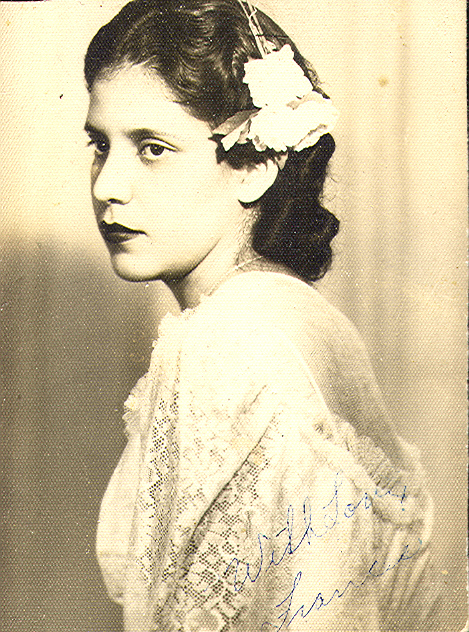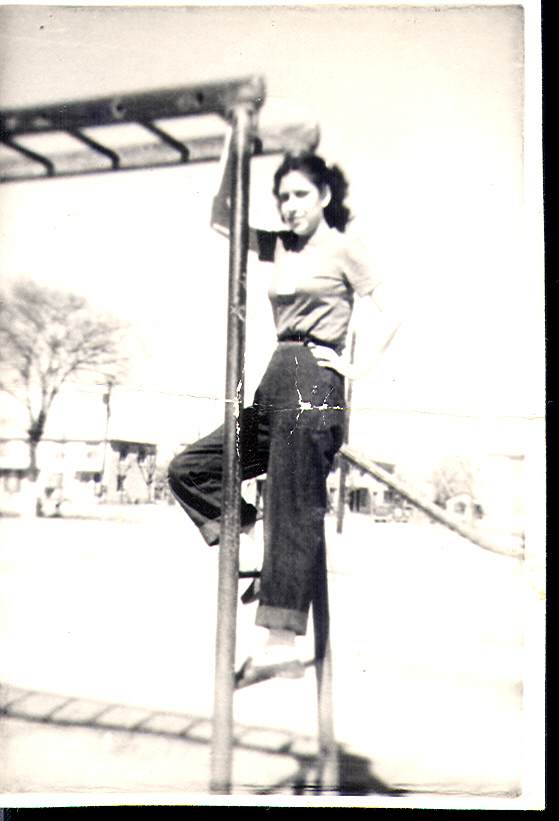Frances Cervantes (nee Alejandro)


Did you move around a lot?
Yes, we moved around alot because we rented houses and we could only afford so much.
When we couldn't afford the rent we went to live with my grandma.
What were your school days like during the war?
My school days were sad because alot of seniors were trying to make a decision on
whether or not to graduate or go volunteer in the army and fight the war

What was your life like during the war?
Most of the time we were just listening to the radio alot and it was scary because
we didn't know if we were going to be bombed on the east coast or the west coast.
Were you working during the war?
No
How did your family go about their lives during this time?
My mother was the type who worried alot and her oldest brother volunteered for both
World War I and World War II
How would you and your family keep track of the war?
We listened to the radio and bought a news paper from the boys who were always yelling
extra extra.
Do you remember how the media portrayed World War II?
Well it wasn't as gory as it is today. The newspapers would have alot of pictures of the
war and maps and the latest in everything. Even in the movie theaters before a show started
a newsreel was shown to give everyone the latest.
Do you remember how the president handled the war situation
I don't know how to answer this but I do know he let all his sons go to war.
What was your reaction to the bombing of Pearl Harbor?
We heard it on the radio and we couldn't believe we were being bombed in Hawaii.
How did your family react to the bombing of Pearl Harbor?
My mother was worried because her oldest brother was in the navy and she didn't know if he
was among the naval ships that were being bombed.
Since the country was coming out of the great depression, was it still hard to buy
things during World War II?
Yes we had to ration gas and food because it was needed for the military to survive.
Did you have to ration food?
Yes because we wanted to make sure the military got fed. We also had victory gardens
where we grew some of our own food.
How did you react when President Franklin D. Roosevelt died?
That was so sad and we were in disbelief. We heard it on the radio and he died so close
to the end of the war. He didn't get to see the end of World War II.
How did the media portray that event?
We heard it through the newspapers and the paper had pictures of the president. The
papers were also selling very fast.
I remember you talking about a polio outbreak during your high school years, what
was that about?
All of a sudden everyone came down with polio and we didn't know where it was coming
from.
What effects did the polio scare have on you and everyone else?
It didn't scare me. I figured it came from people going out and our family never went
out. None of us got the disease. However my senior prom was cancelled which would have been
my first ever dance and graduation was 2 weeks late.
What was your reaction to the bombings of Hiroshima and Nagasaki?
I didn't like the idea of so many innocent people dying, but it was the only way to stop
the Japanese from killing our people
What was your reaction to the signing of the end of World War II?
RELIEF FINALLY!!!! No more killings!!!
What else would you like to add?
War is horrible.
Remembering Pearl Harbor December 7, 1941. National Geographic. http://plasma.nationalgeographic.com/pearlharbor/ (2001). Maps and other documentation on the bombing of Pearl Harbor, HI. History and personal perspectives from that fateful and horrible morning.
Franklin Delano Roosevelt (1933-1945).The Rector and visitors of the University of Virginia http://www.americanpresident.org/history.franklindelanoroosevelt/ (2003). An overview of the life of President Roosevelt. This summarizes his life leading up to his presidency, his presidential term, and the cause and time of his death in office before the end of World War II.
Tanimoto, Kiyoko; I Could Not Forgive.Soon Online Magazine http://www.soon.org.uk/page3.htm (2003). A personal eyewitness story on the bombing of Hiroshima. He describes what his experiences were and how they are still vivid in his mind today.
The 59th Anniversary of the Hiroshima Bombing.The China Daily http://www.chinadaily.com.cn/english/doc/2004-08/06/content_362420.htm (2004). Photos of the Japanese people remembering the bombing of Hiroshima .